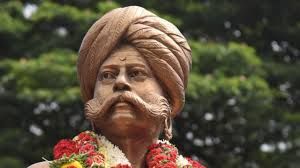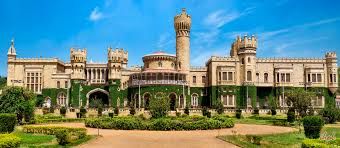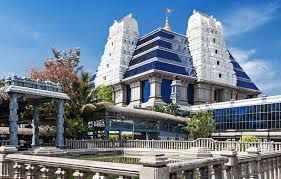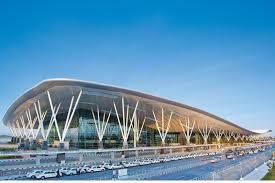Bengaluru, where morning mist meets green trees and the smell of fresh coffee fills the air, is a city that resonates with an inner voice saying, "I Love Bangalore." It's a place where ancient temples stand beside modern tech parks, creating a unique and exciting vibe. From its origins in the 16th century to becoming India's tech hub, Bengaluru has something for everyone.
Bangalore's Historical Significance and Milestones
|
|
Bangalore's history is a rich tapestry of diverse influences and significant events that have shaped its unique character and trajectory. The city was founded in 1537 by Kempe Gowda I, a chieftain under the Vijayanagara Empire. Kempe Gowda envisioned Bangalore as a formidable commercial and military stronghold, initiating its development by constructing a robust fort, several temples, and an efficient network of roads. His vision laid the groundwork for the city's future growth and strategic importance. |
In the 17th century, Bangalore experienced brief control periods under the Bijapur Sultanate and later the Marathas. These rulers brought their influences, particularly in military strategies and regional architecture, which added new layers to the city’s cultural and structural landscape. The Mughal Empire also had a short-lived presence in Bangalore, which they sold to the Wodeyar dynasty of Mysore.
The Wodeyar dynasty, especially under the rule of Chikkadevaraja Wodeyar, was instrumental in the city’s flourishing. They focused on infrastructure development and boosting trade, establishing vibrant markets and promoting arts and culture. This period marked a significant phase in Bangalore’s evolution, enhancing its economic and cultural fabric.
The arrival of Hyder Ali and his son Tipu Sultan in the 18th century transformed Bangalore into a significant military base. They fortified the city by building formidable forts and palaces, and they also contributed to its botanical heritage by creating Lal Bagh, a garden that remains one of Bangalore’s botanical treasures to this day.
In 1799, the British defeated Tipu Sultan and took control of Bangalore, marking the beginning of a new era. The British established the Bangalore Cantonment, an area distinct from the traditional town, and introduced modern infrastructure. They built roads, railways, and public buildings, which laid the foundation for Bangalore’s future urban development. This period also saw the blending of colonial and indigenous influences, shaping the city's unique architectural and cultural identity.
Post-Independence, Bangalore emerged as a centre for public sector industries, research institutions, and higher education. This development was crucial in positioning the city as a hub for innovation and intellectual growth. The establishment of IT parks in the 1990s marked the beginning of Bangalore’s transformation into an international technology hub, often referred to as the Silicon Valley of India. This technological boom attracted global attention, investments, and a diverse population, driving the city's rapid urbanization and modernization.
Landmarks and Monuments: Historical Sites and Their Stories
Bangalore, with its rich historical backdrop, boasts numerous landmarks and monuments that tell the stories of its diverse past. Each site encapsulates a chapter in the city’s history, reflecting its cultural evolution and the various influences that have shaped it over centuries.
Bangalore Fort
|
Originally constructed by Kempe Gowda I in 1537, Bangalore Fort was a mud fort which was later transformed into a stone fort by Hyder Ali in 1761. The fort stands as a testament to the city’s strategic military importance. Despite partial destruction during British capture in 1791, remnants of the fort, such as the Delhi Gate and a Ganapati temple, still evoke the city’s storied past. |
|
Tipu Sultan's Summer Palace
Located within the Bangalore Fort, Tipu Sultan's Summer Palace is an exquisite example of Indo-Islamic architecture. Completed in 1791, it served as a summer retreat for Tipu Sultan. The palace, adorned with ornate arches, balconies, and intricate woodwork, now houses a museum showcasing artefacts from Tipu Sultan’s reign, offering a glimpse into the life and times of the Tiger of Mysore.
Lal Bagh Botanical Garden
Commissioned by Hyder Ali and later expanded by his son, Tipu Sultan, Lal Bagh is a botanical garden renowned for its extensive collection of plants and the iconic glass house modelled after London’s Crystal Palace. Established in the 18th century, it continues to be a verdant oasis in the city, hosting the annual flower shows and offering a historical escape amid Bangalore's urban hustle.
Bangalore Palace
Inspired by England’s Windsor Castle, Bangalore Palace was constructed in 1878 by Chamaraja Wodeyar. The palace’s Tudor-style architecture, complete with fortified towers, turrets, and elegant interiors, reflects the opulence of the Wodeyar dynasty. Today, the palace serves as a venue for cultural events and concerts, blending historical grandeur with contemporary relevance.
Vidhana Soudha
A symbol of Bangalore’s post-independence era, Vidhana Soudha is an imposing structure that houses the Karnataka State Legislature and Secretariat. Completed in 1956, its neo-Dravidian architectural style, with grand granite steps and intricate carvings, signifies the region’s political aspirations and modern governance. It stands as a monumental reminder of Bangalore’s transition into a modern metropolis.
St. Mary’s Basilica
One of the oldest churches in Bangalore, St. Mary’s Basilica, traces its origins to the 17th century. Elevated to the status of a basilica in 1973, this Gothic-style church is renowned for its stately arches, stained glass windows, and a revered statue of Mother Mary. It serves as a centre of faith and heritage, drawing devotees and history enthusiasts alike.
Ulsoor Lake
Dating back to the time of Kempe Gowda II, Ulsoor Lake is one of the oldest and largest lakes in Bangalore. Spanning over 120 acres, the lake is dotted with islands and surrounded by lush greenery, offering a serene retreat in the heart of the city. It stands as a reminder of Bangalore’s historical emphasis on water conservation and urban planning.
ISKCON Temple Bangalore
|
|
The International Society for Krishna Consciousness (ISKCON) Temple, inaugurated in 1997, is a modern architectural marvel that blends traditional South Indian temple architecture with contemporary design. Located atop Hare Krishna Hill, it is a major spiritual and cultural hub, drawing visitors for its elaborate rituals, festivals, and the mesmerizing beauty of its structure. |
Attara Kacheri (High Court of Karnataka)
Adjacent to Vidhana Soudha, Attara Kacheri is a red-brick building in Greco-Roman style, built-in 1868 under British rule. It houses the High Court of Karnataka and stands as a symbol of Bangalore’s legal heritage and colonial history. The contrast between its vibrant red facade and the surrounding greenery makes it a striking landmark.
Nandi Temple (Bull Temple)
Located in Basavanagudi, the Nandi Temple is dedicated to Nandi, the sacred bull attendant of Lord Shiva. Constructed in the 16th century by Kempe Gowda, the temple features a massive granite Nandi statue, carved out of a single rock. This Dravidian-style temple remains a significant religious site and a fine example of traditional South Indian architecture.
Transportation and Connectivity in Bangalore
Public Transport: Buses, Metro, and Other Public Transport
Bangalore's public transport system is robust and diverse, catering to the needs of its vast population. The Bangalore Metropolitan Transport Corporation (BMTC) operates an extensive network of buses covering the entire city and its outskirts. These buses range from regular services to air-conditioned Volvo buses, providing comfortable travel options.
Bangalore's public transport system is robust and diverse, catering to the needs of its vast population. The Bangalore Metropolitan Transport Corporation (BMTC) operates an extensive network of buses covering the entire city and its outskirts. These buses range from regular services to air-conditioned Volvo buses, providing comfortable travel options. The Namma Metro, Bangalore's rapid transit system, significantly eases the city's traffic woes, connecting major areas through its Green and Purple lines, with further expansions underway. Additionally, auto-rickshaws and app-based cab services like Ola and Uber offer convenient last-mile connectivity, ensuring smooth and hassle-free commutes.
Roads and Highways: Major Roads and Connectivity to Other Cities
Bangalore is well-connected through an extensive network of roads and highways. Major arterial roads such as MG Road, Brigade Road, and Bannerghatta Road facilitate intra-city travel. The Outer Ring Road (ORR) and NICE Road (Nandi Infrastructure Corridor Enterprises Road) provide efficient bypasses for city traffic, linking key suburban areas and industrial zones. National highways like NH 44, NH 48, and NH 275 connect Bangalore to important cities and regions across India, ensuring smooth intercity travel. These highways link Bangalore to cities like Chennai, Hyderabad, and Mumbai, making road trips and transportation of goods seamless.
Air Travel: Information about Kempegowda International Airport
|
Kempegowda International Airport (BLR) serves as Bangalore's primary aviation hub, situated about 40 kilometres from the city centre. It is one of the busiest airports in India, offering both domestic and international flights. The airport boasts modern amenities, including duty-free shops, lounges, and a variety of dining options, ensuring a comfortable travel experience. |
|
Events and Festivals in Bangalore
Bangalore is a city known for its vibrant calendar of events and festivals, reflecting its cultural richness and dynamic community spirit. Major annual events include the Bangalore Literature Festival, which gathers renowned authors and thinkers from around the globe, and the Bangalore International Film Festival (BIFFes), showcasing a diverse array of Indian and international cinema. The city also hosts the Bengaluru Tech Summit, a key event in the technology and innovation sector, and the Bangalore Fashion Week, a platform for emerging and established designers to showcase their latest collections.
Cultural festivals in Bangalore highlight its diverse heritage and traditions. The Karaga Festival, held at the Dharmaraya Swamy Temple, is a traditional celebration honouring Goddess Draupadi with elaborate processions and rituals. The Bengaluru Habba (Bangalore Habba) is a city-wide cultural extravaganza featuring music, dance performances, art exhibitions, and street events.
Additionally, the Varamahalakshmi Festival, celebrated in homes and temples across Bangalore, pays homage to the goddess of wealth and prosperity with prayers and festivities.
In the realm of business and technology, Bangalore hosts prominent conferences and expos. The India Electronics Week (IEW) at the Bangalore International Exhibition Centre (BIEC) focuses on electronics, embedded systems, and IoT innovations. The Bangalore IT.in (now Bengaluru Tech Summit) is a flagship event for IT and technology sectors, showcasing cutting-edge advancements and trends. Meanwhile, the NASSCOM India Leadership Forum gathers industry leaders to discuss emerging opportunities and challenges in IT and business services.
Economic Hub:
Information Technology and Software Development
The global leader in information technology and software development. The city is home to numerous multinational corporations and tech giants such as Infosys, Wipro, and Tata Consultancy Services (TCS). These companies provide a range of IT services, including software development, consulting, and business process outsourcing. Bangalore's reputation as an IT hub attracts skilled professionals from across India and the world, making it a melting pot of talent. The presence of top-tier educational institutions like the Indian Institute of Science (IISc) and the Indian Institute of Management Bangalore (IIMB) further enhances the city's appeal, contributing to a steady pipeline of highly qualified graduates.
Biotechnology and Aerospace Industries
Bangalore is also a key player in the aerospace and aviation sectors. Hindustan Aeronautics Limited (HAL), headquartered in the city, is a major defence and aerospace company involved in the design, development, and manufacture of aircraft, helicopters, and avionics. HAL's contributions to the Indian defence sector are substantial, with projects including the Tejas light combat aircraft and the Dhruv advanced light helicopter.
The presence of aerospace parks and research facilities, such as the Aerospace Park near Devanahalli and the Indian Space Research Organisation (ISRO), has led to advancements in aviation technology. These facilities support a range of activities from component manufacturing to testing and assembly, contributing significantly to the city's economic landscape.
The synergy between the biotechnology and aerospace industries and Bangalore's established IT sector creates a dynamic and innovative economic environment. The city's commitment to research, development, and industrial collaboration ensures its continued leadership in these high-tech fields, driving economic growth and positioning Bangalore as a key player on the global stage.
Infrastructure and Development
Over the years, Bangalore has undergone rapid urbanization and significant infrastructure development. The city's growth is evident in its well-connected transport network, which includes a modern metro system that facilitates smooth commuting for millions of residents and visitors alike. The Bangalore namma Metro, operational since 2011, spans across major parts of the city, easing traffic congestion and enhancing connectivity.
Despite facing challenges associated with rapid growth, such as traffic congestion and environmental concerns, Bangalore continues to expand and modernize its infrastructure. The city boasts numerous flyovers, widened roads, and ongoing projects aimed at further improving transportation efficiency and urban mobility. Additionally, Bangalore's IT parks, commercial complexes, and residential developments contribute to its evolving skyline and economic dynamism.
However, the city's development is not without its issues. Challenges such as water scarcity, waste management, and urban sprawl pose ongoing concerns that require innovative solutions and sustainable planning. Nevertheless, Bangalore's commitment to infrastructure development underscores its status as a key economic and cultural centre in India, striving to balance growth with environmental sustainability and quality of life for its residents.
Startup Ecosystem and Innovation
Bangalore is renowned for its vibrant startup ecosystem, often regarded as the startup capital of India. The city is home to numerous incubators, accelerators, and co-working spaces that support budding entrepreneurs. Organizations like NASSCOM and the Karnataka Startup Cell provide mentorship, funding, and networking opportunities, helping startups scale their operations. The presence of venture capital firms and angel investors further fuels the growth of innovative businesses. Bangalore's culture of innovation and entrepreneurship has given rise to successful startups across various sectors, including fintech, e-commerce, health tech, and edtech. The city’s commitment to fostering innovation ensures its continued relevance and growth in the global economy.
Economic Diversification
Beyond IT, biotechnology, and aerospace, Bangalore has a diverse economy that includes manufacturing, telecommunications, and services. The city's manufacturing sector is robust, with industries producing electronics, machinery, textiles, and automobiles. Telecommunications companies, both domestic and international, have a strong presence in Bangalore, contributing to the city's connectivity and communication infrastructure. The service sector, encompassing finance, hospitality, retail, and real estate, also plays a significant role in Bangalore's economic landscape. The city's dynamic and diversified economy makes it resilient and adaptable to changing global economic conditions.
Geography and Climate
Bangalore is located in southern India, on the Deccan Plateau. It sits at an elevation of approximately 900 meters (3,000 feet) above sea level, which contributes to its moderate climate. The city covers an area of around 741 square kilometres (286 square miles).
Bangalore sits at an elevation of approximately 900 meters (3,000 feet) above sea level. This elevation contributes to its moderate climate, with mild summers, relatively cool winters, and a distinct monsoon season. Summers (March to May) see temperatures ranging between 20°C (68°F) and 36°C (97°F). During the monsoon season (June to September), the city receives moderate to heavy rainfall, averaging about 970 mm (38 inches) annually. Winters (November to February) are pleasant, with temperatures between 12°C (54°F) and 29°C (84°F).
Bangalore is renowned for its lush greenery, parks, and lakes. Notable parks include Lalbagh Botanical Garden and Cubbon Park, providing a refreshing break from the urban hustle. The city's lakes, such as Ulsoor Lake and Sankey Tank, are popular for leisure and recreation. Despite rapid urbanization, efforts to preserve these natural spaces contribute to Bangalore's reputation as a green city with a pleasant climate year-round.
Tourism and Attractions in Bangalore
Parks and Gardens: Famous Parks like Lalbagh and Cubbon Park
Bangalore boasts some of the most beautiful parks and gardens in India. Lalbagh Botanical Garden, a historic garden with a vast collection of tropical plants and trees, is famous for its Glass House, Lalbagh Rock (one of the oldest rock formations), and vibrant flower shows. Cubbon Park, a large green oasis in the heart of the city, is perfect for leisurely walks and picnics, featuring landmarks like the Bangalore High Court, State Central Library, and museums within the park
Bannerghatta National Park offers a unique experience with its wildlife and safari adventures, including a biological park, butterfly park, and zoo. Lumbini Gardens, along the Nagawara Lake, is a family-friendly waterfront park known for boating, a wave pool, and children's play areas.
Museums and Galleries: Key Museums and Art Galleries
Bangalore's museums and art galleries showcase the city's rich cultural heritage and modern art scene. The Visvesvaraya Industrial and Technological Museum is an interactive space dedicated to science and technology, featuring exhibits like the Engine Hall and space gallery.
-
Visvesvaraya Industrial and Technological Museum – An engaging, interactive museum dedicated to science and technology. Its highlights include the Engine Hall, the Space Gallery, and hands-on exhibits that make it a favorite among students and science enthusiasts.
-
Government Museum – One of the oldest museums in India, it houses rare collections of archaeological artifacts, coins, sculptures, and inscriptions, offering a glimpse into the region’s rich past.
-
National Gallery of Modern Art (NGMA) – A haven for art lovers, NGMA showcases works by modern and contemporary Indian artists. Its exhibitions and curated displays celebrate the evolution of Indian art across decades.
-
HAL Aerospace Museum – A unique museum dedicated to aviation and aerospace, featuring aircraft models, flight simulators, and exhibits on India’s aviation history.
Related Posts
IT Jobs in Bangalore
Explore top IT jobs in Bangalore. Discover exciting opportunities in tech, from ...
IT Companies in Marathahalli
Struggling to find the best IT companies in Marathahalli? Don't miss out on top ...
MBA in Digital Marketing Colleges in Bangalore
Explore top colleges in Bangalore offering MBA in Digital Marketing. Boost your ...
Top Digital Marketing Colleges in Bangalore
Find the top digital marketing colleges in Bangalore offering excellent courses ...
Impact of AI and ML on Bangalore’s Digital Marketing
Explore the transformative impact of AI and ML on Bangalore’s digital marketing,...
IT jobs in Bangalore for freshers
Explore IT jobs in Bangalore for freshers, including roles in software developm...




























































